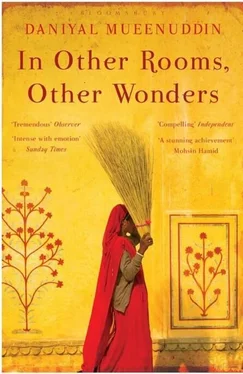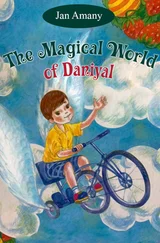Finishing the tale, Husna was silent for a moment, then narrowed her eyes, collecting herself. ‘In this world some families rise and some fall,’ she said. ‘And now I’ve come to you for help. I’m poor and need a job. Even Begum Harouni agrees that I should have a profession. My father can give me nothing, he’s weak and has lost his connections. Everyone says I should marry, but I won’t.’
Outside the living room, overlooking a side patio, a gardener switched on yard lights, illuminating a cement swimming pool half filled with rainwater and leaves. A servant entered the room with an armful of wood, threw it with a crash into the fireplace, then took a bottle of kerosene and poured a liberal splash. He tossed in a match and the fire roared up. For a moment, he rested on his haunches by the fire, grave before this immemorial mystery, then broke the spell, rose, and left the room.
A car drove up the long circular driveway. A minute later, an elderly couple entered the room. Kissing Harouni on the cheek, the woman said in a husky voice, ‘Hello, darling.’ The man, gray beside his brightly dressed companion, his mustache trimmed, waited to one side.
‘Hello, Riffat,’ Harouni said, kissing her on the top of the head and then going over to the wall and pressing a bell. ‘Will you have a drink, Husky?’
The man glanced at his wife. ‘I’ll have a small whiskey.’
The visitor wore a pinkish kurta, too young for her but certainly very expensive, finely printed with a silver design. She eyed Husna, as if pricing her.
‘This is Husna,’ K. K. said to the woman, who had taken a seat on the sofa beside the young girl. ‘Husna will graduate soon and is looking for a teaching position.’
‘How interesting,’ said the woman.
They had been speaking in English, and Husna exposed her poor accent, saying, ‘It is very good to meet you.’
Two servants carried in a tea trolley and placed it before the newcomer. The butler, Rafik, brought two whiskeys on a small silver tray.
‘Cheers,’ said Husky, taking a sip and very slightly smacking his lips. ‘How nice to have a fire.’
Riffat Begum poured out tea, offering a cup to Husna. The conversation wandered, and Riffat looked meaningfully at Husna once or twice. When she went out in society with Begum Harouni, Husna was not a guest, not even really a presence, but a recourse for the old lady, to fetch and carry, to stay beside her so that the Begum would not be left alone. Unable now to meet the occasion, Husna followed the conversation from face to face, the skin around her mouth taut as if frozen. Abruptly she stood up, catching a foot on the tea trolley, rattling the cups and saucers.
‘Thank you, Uncle, for your help and your kind advice,’ she said, although K. K. had given her no advice whatsoever. She meant this as an opening to him, at least as a reproach.
‘Let me have the car drop you.’ He followed Husna onto the verandah, while the driver brought the car. ‘First of all, you need to develop some skills,’ he said. ‘Why don’t you learn to type? Come tomorrow and I’ll arrange for Shah Sahib to give you lessons.’
As she got in the car he gave her a fatherly kiss on the cheek.
When he returned to the living room, Riffat raised an eyebrow and pursed her lips. ‘Naughty naughty,’ she said, exhaling a cloud of cigarette smoke.
K. K. took a sip of whiskey. ‘At my age, my dear, she’s in no danger.’
Husna came every few days for typing lessons. She would sit in the dark office off the living room, inconveniencing Shah Sahib, the secretary, who could not continue his own work until she had abandoned her weak efforts. He tried to show her the correct technique, but she refused to learn, and insisted upon typing by hunt and peck, getting through her daily half page as quickly as possible. One of the servants would bring her a cup of tea, which she drank with Shah Sahib, who also at that time received two slices of grilled cheese toast, a treat that made his stomach growl, and one that he ensured by being of service to the cook, passing his bills without question.
K. K. Harouni, who had been a polo and tennis player until he suffered a heart attack seven years earlier, took a walk morning and evening, totaling exactly four miles each day. Usually he went from one end to the other of the serpentine back garden, but a few days after Husna began her lessons, a winter rain wet the grass. Mildly enjoying the break in routine, that evening he walked on the brick-paved front driveway, looping around a circular lawn and through a carport in which a misplaced glass chandelier cast a friendly yellow light.
At dusk he heard a rickshaw enter the drive and park at the far end, next to the gatekeeper’s shelter, its two-stroke engine crackling. After a moment a figure stepped from the door of the secretary’s office and tripped rapidly down toward the gate. Lengthening his stride, K. K. came up behind her.
‘Hello, Husna,’ he said.
She stopped and turned. As before, she wore too much makeup and clothes that were too bright. She carried her large white purse on a long chain over one shoulder, and had covered her hair with a dupatta . ‘Hello, Uncle,’ she said, her face involuntarily stretching into a broad smile.
‘You’re very cheerful. And how are your lessons?’
‘Thank you, Uncle,’ she said.
‘Why don’t you walk with me?’
‘My ride is waiting.’ She spoke timidly, for she felt ashamed to be seen taking a rickshaw, which only the lower classes used. ‘Tell him to go, and later the driver can take you.’
They began walking, Husna taking two strides to every one of his, clicking along in her heels. Her feet began to hurt, and whenever they came to a puddle he would step aside and allow her to go first, so that she had to hurry awkwardly in front of him.
‘Those shoes aren’t good for walking,’ he said, looking at her from behind as she skirted a puddle. ‘Your feet are hurting, aren’t they?’
‘No, it’s fine, really it is.’ She didn’t want to lose this chance of his company.
‘Why don’t you take them off. Don’t be shy, there’s no one here.’
‘You’re joking with me, Uncle.’
Hesitating for a moment, she reached down and undid the straps, her hand resting tentatively on his shoulder.
When they came to the next puddle, he stopped, amused. ‘And now that you’re barefoot, let’s see you jump over the puddle.’
Quickening, she glanced at him sideways, still a girl at twenty, still playing tag with her cousins in the courtyard of her parents’ home; and yet aware of men’s eyes flickering over her as she walked through the lanes of the Old City.
He took her hand and swung it. ‘One, two, three, over you go!’
She hesitated for moment, refusing the jump, then leapt, landing just at the edge and splashing.
‘Try again, the second one!’ he urged, and she jumped the next puddle, clearing it, then turning to face him, laughing.
‘Well done! I’ve had ponies that couldn’t do as well.’
‘Now you are joking with me.’
Rafik came out of the house and reported a telephone call from K. K.’s youngest daughter, Sarwat, who was married to a tremendously wealthy industrialist and lived in Karachi. K. K. went inside, walking unhurriedly, and Husna sat down in one of the chairs placed on the verandah for the petitioners who came each morning, asking the old man for letters to government officials or for work on his farms.
Rafik stood next to her, relaxed, looking out into the night. He glanced at her bare feet but made no comment.
‘So, Husna Bibi,’he said, ‘how are the good people over at Begum Sahib’s house? How is Chacha Latif?’
Chacha Latif played the corresponding role of butler in the house of K. K.’s estranged wife, and Rafik maintained cordial relations with him. As a matter of comity they kept each other informed of household gossip.
Читать дальше












